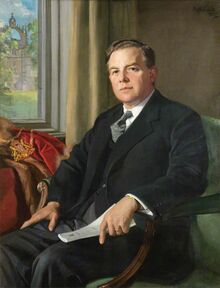Nicholas XII of Æthele: Difference between revisions
No edit summary |
m (removed Ajax category) |
||
| (3 intermediate revisions by one other user not shown) | |||
| Line 1: | Line 1: | ||
{{wip}} | {{wip}} | ||
{{Infobox royalty | {{Infobox royalty | ||
| Line 33: | Line 32: | ||
| religion = {{wp|Roman Catholic Church|Fabrian Catholic}} | | religion = {{wp|Roman Catholic Church|Fabrian Catholic}} | ||
|}} | |}} | ||
'''Nicholas XII''' (James Walter Phillip Symon; 9 April 1915 – 6 June 1978) was King of the Æthics from 19 March 1941 until his death on | '''Nicholas XII''' (James Walter Phillip Symon; 9 April 1915 – 6 June 1978) was King of the Æthics from 19 March 1941 until his death on 6 June 1978. Known publicly as James until his accession, and "Jamie" among his family and close friends, Nicholas XII was born in the reign of his father [[Nicholas XI of Æthele|Nicholas XI]]. As the first son of King Nicholas XI, who had preserved the [[Monarchy of Æthele|Æthic monarchy]] during and following the [[Æthic Civil War]] he attended the [[Royal Military Academy of Edmond]] as a teenager, and served in the Army in the 1930s. He married Duchess [[Margaret, Princess of Klydesmaron|Margaret Hughes Barrow]] of the House of Klydesmaron in 1937 and they had two songs, [[Wealhmær VII of Æthele|Wealhmær]] and [[Phillip, Prince of Nærthwall|Phillip]]. | ||
During Nicholas' reign, the activities of the Æthic Free Movement led to the [[Æthic crisis]], which lasted from 1954 to 1968. The [[House of Delegates of Æthele|House of Delegates]] voluntarily decreased the power of the monarch. Though Nicholas' forces had been able to successfully defeat the | During Nicholas' reign, the activities of the Æthic Free Movement led to the [[Æthic crisis]], which lasted from 1954 to 1968, caused large political instability in the country. The [[House of Delegates of Æthele|House of Delegates]] voluntarily decreased the power of the monarch. Though Nicholas' forces had been able to successfully defeat the ÆFM insurgency, the Royal Court became increasingly scrutinized by the public. Throughout much of his later life, he was beset by smoking-related health problems in the later years of his reign. He was succeeded by his elder son, [[Wealhmær VII of Æthele|Wealhmær VII]]. | ||
Latest revision as of 19:43, 2 February 2022
This article is incomplete because it is pending further input from participants, or it is a work-in-progress by one author. Please comment on this article's talk page to share your input, comments and questions. Note: To contribute to this article, you may need to seek help from the author(s) of this page. |
| Nicholas XII | |||||
|---|---|---|---|---|---|
 | |||||
| King of the Æthics (Cyng sé Æthréd) | |||||
| Reign | 19 March 1941 – 6 June 1978 | ||||
| Coronation | 10 April 1941 | ||||
| Predecessor | Nicholas XI | ||||
| Successor | Wealhmær VII | ||||
| Lord Ministers | See list
| ||||
| Born | 9 April 1915 Royal Court of Edmond, Edmond, Æthele | ||||
| Died | 6 June 1978 (aged 63) Royal Court of Edmond, Edmond, Æthele | ||||
| Spouse | Margaret, Princess of Klydesmaron (m. 1937) | ||||
| Issue | |||||
| |||||
| House | Corraidhín | ||||
| Father | Nicholas XI | ||||
| Mother | Beatrice of Ghant | ||||
| Religion | Fabrian Catholic | ||||
Nicholas XII (James Walter Phillip Symon; 9 April 1915 – 6 June 1978) was King of the Æthics from 19 March 1941 until his death on 6 June 1978. Known publicly as James until his accession, and "Jamie" among his family and close friends, Nicholas XII was born in the reign of his father Nicholas XI. As the first son of King Nicholas XI, who had preserved the Æthic monarchy during and following the Æthic Civil War he attended the Royal Military Academy of Edmond as a teenager, and served in the Army in the 1930s. He married Duchess Margaret Hughes Barrow of the House of Klydesmaron in 1937 and they had two songs, Wealhmær and Phillip.
During Nicholas' reign, the activities of the Æthic Free Movement led to the Æthic crisis, which lasted from 1954 to 1968, caused large political instability in the country. The House of Delegates voluntarily decreased the power of the monarch. Though Nicholas' forces had been able to successfully defeat the ÆFM insurgency, the Royal Court became increasingly scrutinized by the public. Throughout much of his later life, he was beset by smoking-related health problems in the later years of his reign. He was succeeded by his elder son, Wealhmær VII.